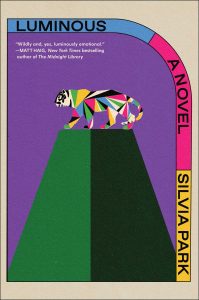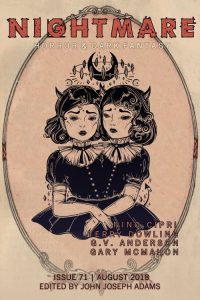Luminous by Silvia Park: Review by Abigail Nussbaum
 Luminous, Silvia Park (Simon & Schuster 978-1-66802-166-8, 400pp, $29.99, hc) March 2025.
Luminous, Silvia Park (Simon & Schuster 978-1-66802-166-8, 400pp, $29.99, hc) March 2025.
The woman might have been beautiful once. Lips pink and plush, and long blond hair, the kind that shone with each brush. She was falling apart. Her face had been shredded into confetti, held together by one bleary blue eye, while her torso was a smooth bioplastic vest, translucent as a milk carton. Ruijie had tried pressing the power button located on the nape of the woman’s neck. She’d gotten a twitch of the ankles, a froggy jolt, but nothing. The robot was dead.
For more than a century, robots have held a fascination for science fiction authors. They are us, but also not us, and this raises some pressing questions. Are they our slaves? Are they our children? Will they rise against us? Will they become us, or us them? In their debut novel, Luminous, Silvia Park delivers a meditation on these questions that is a more-than-worthy successor to classics of the genre like Do Androids Dream of Electric Sheep? and A.I.: Artificial Intelligence – and which is also an early contender for one of the best science fiction novels of the year.
Set in a future, unified Korea, Luminous establishes its terms and focus in its opening paragraph, in which it lists the casualties of a brutal heat wave: “thirty heat deaths in Seoul, punctuated by the spectacular fizzing breakdown of a GS-100 security android when it crumpled knees-first outside a United Korea Bank.” Does the robot count in the tally of deaths? The description is ambiguous – all the more so when we learn that the robot’s remains are swept up by street cleaners (also robotic, of course), while its head is “left grinning on the pavement, chirping at passersby to warn them of today’s heat.”
This ambivalence persists when we encounter one of our main characters. Jun is a detective in the robot crimes department, a cop who gets called in when people’s companion bots are abducted or destroyed. Whether this counts as property or violent crime is a bit of a moving target. Jun and his colleagues routinely use terms like “kidnapped” and “killed.” The owners they interact with – such as the woman whose missing robot, a popular little girl model called Eli, kickstarts the novel’s plot – often refer to them as their children.
In the same breath, however, Jun admits that the punishments for destroying a robot rarely rise above a fine. His colleague Lee reminisces about the case of a kidnapped child, later found murdered: “Sgt. Son wanted to tell the parents in person. He rang their door and lo! The same boy answered. That couple couldn’t wait two weeks before replacing their son with the same model. And why wouldn’t you? If you need a coffee machine, you get a new coffee machine.”
The more we learn about Luminous’s world, however, the more this distinction between robot and human feels more like a social convention than a concrete fact. Jun himself is a case in point: Catastrophically injured during his military service, he is now mostly robotic (“They repaired him by attaching not the bionic to his body but his body to the bionic”). For Jun, a trans man who was saving up for gender confirmation surgery when he joined the army, this produces a different form of dysphoria. His new body looks more masculine than he could have achieved through medical treatments, but nevertheless feels alien. When he’s incorrectly clocked (often by other robots) he likens it to being misgendered.
This slippage persists in the novel’s other subplots. Jun’s sister Morgan, a robotics designer, observes that the women she sees in clubs are competing not with each other but with the latest female robot model (“The early July release of the Yuna·X had already upended plastic surgery trends. Monolids were en vogue again”). Privately, she has opted out of the dating world by building her own robot, Stephen, who is part-butler, part-boyfriend, but whose inability to strike the correct balance between independence and subservience leaves her frustrated. Ruijie, a young girl who suffers from a degenerative illness, dreams of the day when she will be given her own bionic body, and will no longer have to rely on a mechanical exoskeleton.
Jun and Morgan are united (but also torn apart) by their pain over the loss of their older brother Yoyo, an experimental robot designed by their visionary father. Yoyo disappeared, it is eventually strongly hinted, when the military became intrigued by his capabilities; like the loss of any child, this has shattered his family. It is at the root of both siblings’ careers, as they attempt, each in their own way, to repair an irreparable loss – though, in a twist that is perhaps emblematic of the family’s brokenness, their efforts end up running at cross-purposes. When Jun learns that Morgan has modeled the latest robot boy model on Yoyo, he cries out in despair: “when he ends up in a junkyard, I’ll be the one to find him.”
It is, in fact, in the junkyard where Yoyo is found (or rather, some version of Yoyo – his exact identity, like the reason for his disappearance, is a question it takes much of the novel to answer), when a dumpster-diving Ruijie encounters not a dead robot but a living quasi-boy. Mysterious and fey, Yoyo captures Ruijie’s imagination, and together they amass around themselves a group of children dedicated to protecting him – from the disintegration of his body, from scavengers looking for parts to sell, and from the robot fighting ring where Eli, the missing robot Jun has been searching for, ends up.
That image, of children banding together in the shadow world of the junkyard to have their own private adventures, initially feels out of place among the novel’s core science fiction tropes. It’s only when Jun recalls talking to Yoyo about Peter Pan that Park’s meaning crystalizes. Yoyo is the boy who can’t grow up, passing from one generation of children to the next, but always remaining fundamentally unlike them. And like him, the other robot children in the novel – Eli and the robot boys Morgan has been designing, and even Stephen, who is repeatedly described as “one year old” – will not grow up, but they may grow into themselves. Humanity may have been slowly turning itself robotic, but as Luminous reaches its final pages, we and its characters suddenly realize that all the while, the robots have been turning into something else.


Abigail Nussbaum is a Hugo Award-winning critic and the author of the blog Asking The Wrong Questions. Her writing has appeared in The Guardian, New Scientist, The Los Angeles Review of Books, and Strange Horizons, among others, and she is a regular contributor to the progressive culture and politics blog, Lawyers, Guns and Money.
This review and more like it in the March 2025 issue of Locus.
 While you are here, please take a moment to support Locus with a one-time or recurring donation. We rely on reader donations to keep the magazine and site going, and would like to keep the site paywall free, but WE NEED YOUR FINANCIAL SUPPORT to continue quality coverage of the science fiction and fantasy field.
While you are here, please take a moment to support Locus with a one-time or recurring donation. We rely on reader donations to keep the magazine and site going, and would like to keep the site paywall free, but WE NEED YOUR FINANCIAL SUPPORT to continue quality coverage of the science fiction and fantasy field.
©Locus Magazine. Copyrighted material may not be republished without permission of LSFF.







